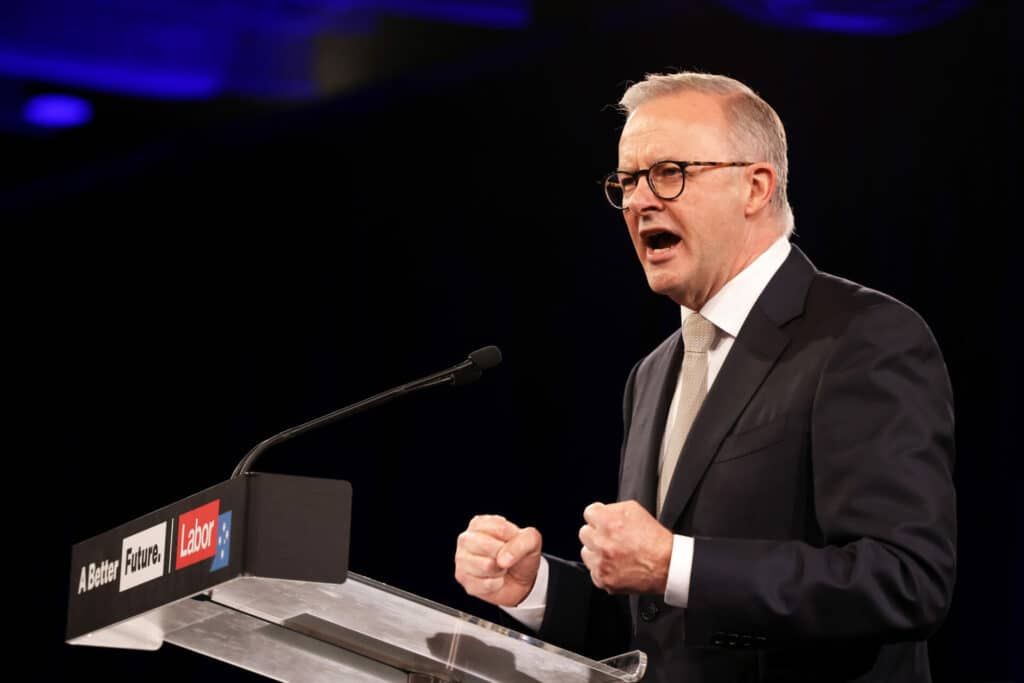How Australia’s new leader can fix the submarine deal
By Alan J. Kuperman | May 22, 2022
 Anthony Albanese, speaking during the Labor Party election campaign launch at Optus Stadium on May 01 in Perth, Australia. He will become the new Australian prime minister as a result of Saturday's election. (Photo by Paul Kane/Getty Images)
Anthony Albanese, speaking during the Labor Party election campaign launch at Optus Stadium on May 01 in Perth, Australia. He will become the new Australian prime minister as a result of Saturday's election. (Photo by Paul Kane/Getty Images)
Australian voters last week ousted their government in favor of the Labor Party, which traditionally opposes both nuclear energy and nuclear weapons. This means the new prime minister, Anthony Albanese, likely will reassess the 2021 AUKUS deal under which the United States and United Kingdom pledged to sell Australia nuclear-powered submarines.
Albanese supports the general idea of AUKUS to counter-balance China, but not necessarily its most controversial aspect, which is that the eight submarines would be fueled with tons of nuclear weapons-grade, highly enriched uranium (HEU)—enough to produce up to 1,000 nuclear warheads if diverted—setting a precedent that would foster proliferation.
Ironically, the United States has tried for decades to halt commerce in weapons-grade uranium, precisely to stop the spread of bombs. Nuclear power reactors use low-enriched uranium (LEU) fuel, which is unsuitable for weapons, and since the 1970s, the US government also has gradually insisted that research reactors, pharmaceutical plants, army reactors, and space reactors use LEU fuel.
In France and China, even submarines use LEU fuel. But the US and UK navies use HEU, so Australia is slated to receive bomb-grade fuel.
By becoming the first country without nuclear weapons to get nuclear submarines, Australia would set a crucial precedent—bad or good—depending on its choice of fuel. Brazil and South Korea are pursuing submarines fueled by LEU, on nonproliferation grounds, but Iran says it needs HEU. If Australia opts for HEU, it would legitimate attempts by Iran and other countries to acquire weapons-grade uranium, too.
That would be a disaster because countries that get HEU for submarines can divert it to nuclear weapons, due to legal and practical constraints on inspections. The International Atomic Energy Agency supervises only “peaceful” nuclear activities, so its inspection agreements explicitly exclude military submarine programs, stating that, “While the nuclear material is in such an activity, the safeguards provided for in the Agreement will not be applied.” This lack of inspection could continue for as long as decades.
Even if a country volunteered for inspections during occasional port calls, it would be impossible to avoid long gaps of months or years. That would stymie verification efforts, because the IAEA says fresh HEU fuel can be converted to nuclear weapons components in just one to three weeks, and even irradiated HEU can be converted in one to three months, long before inspections could uncover a diversion.
Such diversion could occur before fuel is loaded on a submarine, or afterwards via a cargo hatch or by cutting the hull. So, even if Australia imported HEU in “sealed” reactors, it could not eliminate the risk of subsequent misuse, or prevent countries like Iran from citing the precedent to obtain their own HEU.
Fortunately, there is a way for Prime Minister Albanese to reconcile his party’s support for AUKUS and opposition to nuclear weapons—by insisting on LEU submarine fuel, via either of two options.
First, the US Congress annually has funded a program to develop LEU naval fuel since 2016, when President Barack Obama declared that, “in recognition of the nonproliferation benefits to minimizing the use of highly enriched uranium globally, the United States values investigations into the viability of using low-enriched uranium in its naval reactors.” If Congress ramped up funding, the United States could qualify its naval LEU fuel within a decade and incorporate that into the AUKUS submarines, which are projected to start delivery around 2040.
A quicker option would be for Australia to buy smaller French LEU submarines that already are in production and service and could be equipped with a US combat system for interoperability. Their smaller size would suit the manpower of Australia’s navy, whose conventional submarines have a crew of 55, similar to the 65 on France’s nuclear version. By contrast, US submarines require an enormous crew of 135.
LEU fuel would entirely eliminate the proliferation risk of nuclear submarines in countries like Australia that lack plants to enrich uranium or extract plutonium from irradiated fuel. It would not matter whether the submarine contained a lifetime supply of LEU fuel as Congress intends, or required periodic LEU refueling that France could provide in less than a week every 10 years to obviate Australia’s need to acquire such nuclear infrastructure.
Last month, the White House issued an update on AUKUS, committing to “upholding the highest nonproliferation standards.” This is a bogus assertion, if it merely means occasionally inspecting HEU submarines that inherently proliferate atom bomb material. Since the 1970s, the “highest nonproliferation standard” has meant eschewing weapons-grade fuel entirely, especially in countries that lack nuclear arsenals. If Australia opts for LEU submarines, it would reinforce that vital norm, making us all much safer.
Together, we make the world safer.
The Bulletin elevates expert voices above the noise. But as an independent nonprofit organization, our operations depend on the support of readers like you. Help us continue to deliver quality journalism that holds leaders accountable. Your support of our work at any level is important. In return, we promise our coverage will be understandable, influential, vigilant, solution-oriented, and fair-minded. Together we can make a difference.















All that is to say nothing of the absurdity of Australia bearing the enormous cost of constructing nuclear submarines which cannot be nuclear armed. Another “best -in -the -world “ act of stupidity from Australia.
It’s very implausible that Australia would secretly divert and enrich HEU and use it to make nuclear weapons, “by cutting through the hull” or any other way. They have had the scientific brain power and resources to make nuclear weapons if they wanted for years. They signed the NPT a long time ago (1970) and all political parties have supported Australia as a non-nuclear state.
There has always been a section of the Australian community that seeks “security” through acquiring nuclear weapons. It started with Prime Minister Menzies unilaterally offering Australia for the British Empire’s first nuclear bomb, without sharing these plans with Cabinet; it includes the Gorton government announcing a nuclear power plant at Jervis Bay, while acknowledging within Cabinet it would produce enough fissile material for 5 nuclear weapons a year, and it includes even Hugh White recently recommending Australia acquiring nuclear weapons as a way of dealing with China as a superpower… The NPT has a few loopholes, too, for Australia. So… Read more »
The best possible thing Albo can do is to rip up the AUKUS treaty and renew the original deal with France, thus getting them back onside… Getting nuclear attack submarines is simply begging to expand our already massive military budget. Our military budget is around 48B, whilst France’s is 50B, this translates to us having 4.1% GDP or roughly double France’s of 2% GDP. Hell, the USA spends only 3.7% on their gigantic military…